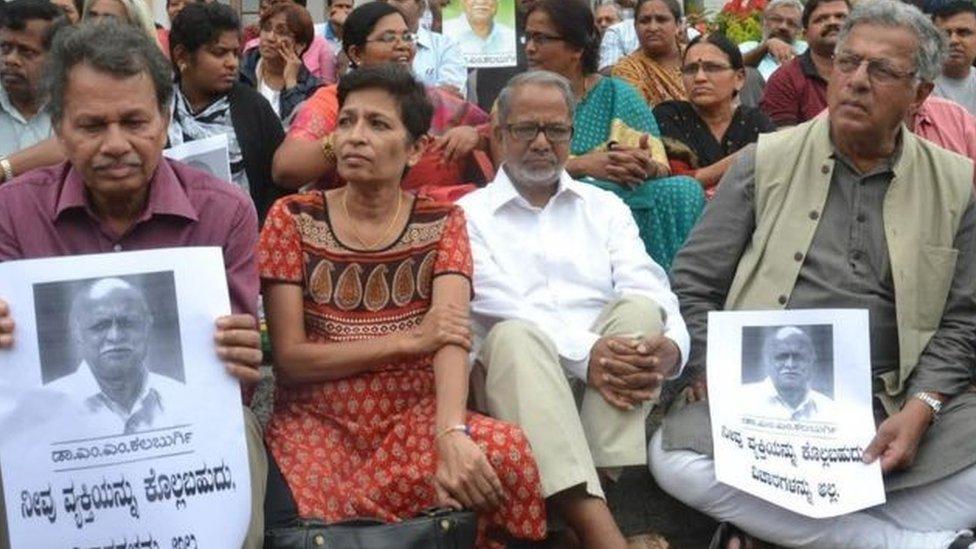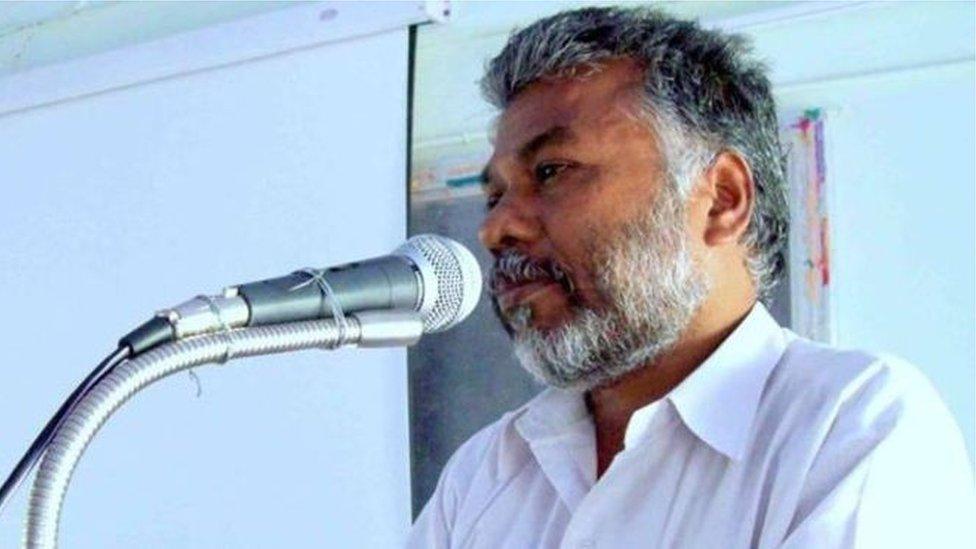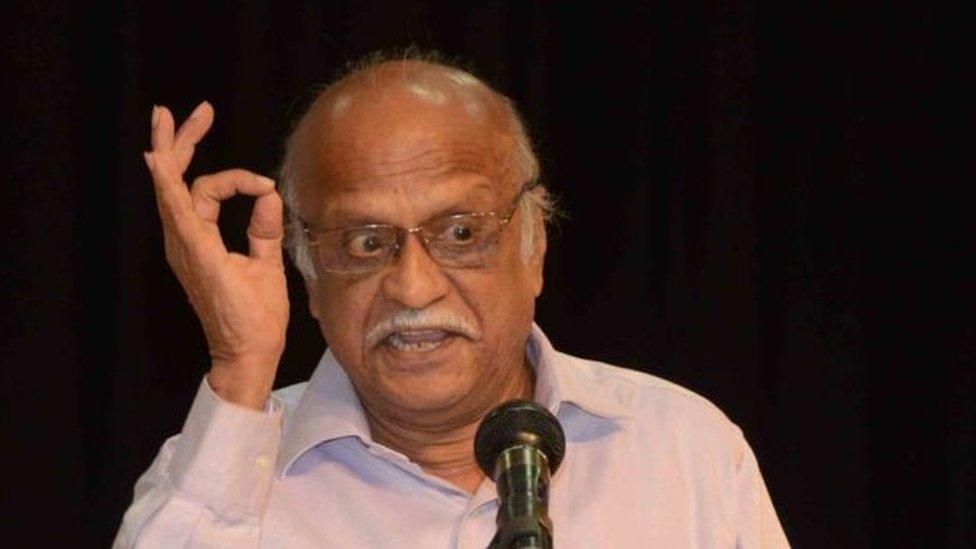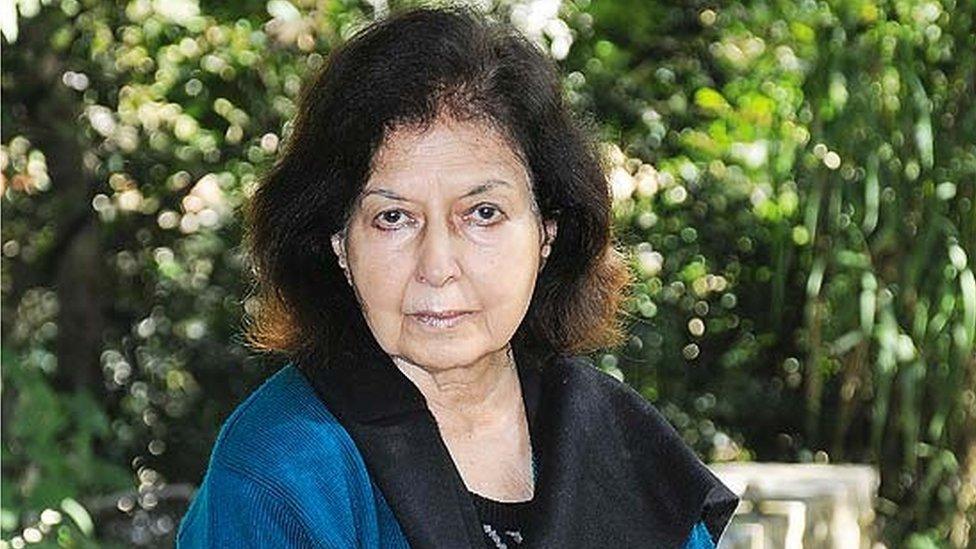How India's writers are fighting intolerance
- Published

The murder of Malleshappa Kalburgi has set off an unusual movement with little precedent
More than 40 Indian writers have returned their literary awards or written letters of protests in an unprecedented challenge against what they call "rising intolerance and growing assault on free speech". Writer and columnist Nilanjana S Roy reports.
On the morning of 30 August, Malleshappa Kalburgi, a leading Indian scholar and well-known rationalist thinker, was talking on his mobile phone to a friend when the doorbell rang.
Dr Kalburgi, 77 was an open-minded, liberal thinker from the southern state of Karnataka whose uncompromising scholarship had often offended powerful Lingayat - an influential Hindu sect that dominates life and politics in the state - as well as Hindu right-wing groups.
When he opened the door, he was shot at close range; his wife and daughter took him to the local hospital, where he was declared dead.
A month-and-a-half later, the murder of this scholar has set off an unusual movement with little precedent. Writers from across the country are standing up in protest against the Sahitya Akademi, a literary body that represents 22 of India's languages, and the state.
'Suppression and violence'
On 12 September, the respected Hindi writer Uday Prakash announced that he was returning his Sahitya Akademi award - one of the highest honours bestowed on Indian authors - along with its other components; a shawl, a plaque and cash prize.
He cited the rise in incidents of "suppression and violence" over the last year - book bans, the plight of writers like Perumal Murugan who was forced into silence after attacks by right-wing groups, the killings of rationalists such as Mr Kalburgi and Govind Pansare, external, as well as the heckling of respected authors such as the late UR Ananthamurthy.
In the same month, six young writers from Karnataka - Veeranna Madiwalar, T Satish Javare Gowda, Sangamesh Menasinakai, Hanumanth Haligeri, Sridevi V. Aloor and Chidananda Sali - said they would return the state awards given to them to protest the delay in arresting Dr Kalburgi's murderers.

Perumal Murugan is one of the finest writers in the Tamil language
Then the venerable Karnataka author Chandrashekhar Patil returned his state awards, plaques, idols and cheques - "everything except the garland", he said.
His aim was to protest the murder of Dr Kalburgi, and also to draw attention to what he saw as the growing assault on free speech and the attacks on rationalists.
Many of these assaults and attacks have been perpetrated in the last year by fringe right-wing groups: it is easy for the government to disclaim any connection with them, but it is also glaringly obvious that it has done very little to discourage groups like the Shri Ram Sene, external, notorious for issuing threats - they offered to cut off the tongues of writers who insulted Hinduism, for instance.
Over the next few weeks, the writers' protest went from a trickle to a river of discontent, led by veterans and members of India's youth generation alike, representing languages from Kannada, Punjabi, Hindi and Kashmiri, to Oriya, English, Malayalam, Urdu and Gujarati.
'Protest and dissent'
In early October, two of India's most highly respected writers, Nayantara Sahgal, 88, and Krishna Sobti, 90, returned their awards. Joining them were Shashi Deshpande, K Satchidanandan and PK Parakkadavu who resigned from the Akademi's councils.
And on Tuesday Punjabi writer Dalip Kaur Tiwana gave up her Padma Shri, the fourth highest civilian honour in India. She said, referring to recent communal atrocities: "To kill those who stand for truth and justice put us to shame in the eyes of the world and God."
At present, over 40 writers from all across the country have returned awards, sent in their resignations or written letters of protest, and the number appears to be rising.
There are reasons why this particular protest is seen as unprecedented: it has drawn in writers (and now translators) from across a variety of political parties, and has cut across regional and language divides.
This is also, as former West Bengal governor Gopalkrishna Gandhi (grandson of Mahatma Gandhi) noted, perhaps the only time that Indian writers have sent back awards to the state in such high numbers - even Indira Gandhi's notorious imposition of Emergency in 1975 did not draw such a strong reaction of "protest and dissent".

Dr Kalburgi was a leading scholar and a well-known rationalist thinker
The protest is about more than just the Sahitya Akademi's failure to respond; Ms Sahgal explains this eloquently in a short letter, external titled the unmaking of India.
"… India's culture of diversity and debate is now under vicious assault. Rationalists who question superstition, anyone who questions any aspect of the ugly and dangerous distortion of Hinduism known as Hindutva - whether in the intellectual or artistic sphere, or whether in terms of food habits and lifestyle - are being marginalised, persecuted, or murdered… The Prime Minister remains silent about this reign of terror. We must assume he dare not alienate evil-doers who support his ideology."
Her views are echoed by many who cited the rise in intolerance in India - several mentioned the recent lynching of a Muslim blacksmith by a mob in Dadri, a short distance from Delhi, as an example of the growth of communal violence unchecked by the state. Author Salman Rushdie has added his voice to the protest, saying that these were "alarming times for free expression in India".
'Stop writing'

Ms Sahgal has criticised the ruling government for the 'rising intolerance'
India's Culture Minister, Mahesh Sharma, responded typically, asking what ideologies these writers represented, and saying, "If they are unable to write, let them stop writing."
But the poets may be more eloquent than any minister.
When Surjit Patar, one of Punjab's most cherished poets, returned his Sahitya Akademi award yesterday, he was blunt: "The practice of killing writers and thinkers in our multilingual, multicultural and multi-religious country is disheartening."
And Hindi poet Rajesh Joshi may have had the last word, when he promised that this movement against fascism would grow.
"There is no breathing space and no freedom of expression for literary writers. It is like losing oxygen because we are writers who wish for free breathing space. I do not need an oxygen cylinder in the form of awards to live."
The state may not wish to hear what these writers have to say, but as the protest spreads with even theatre artistes like Maya Krishna Rao and filmmakers such as Govind Nihalani joining in, it may have to learn to listen.
- Published15 January 2015